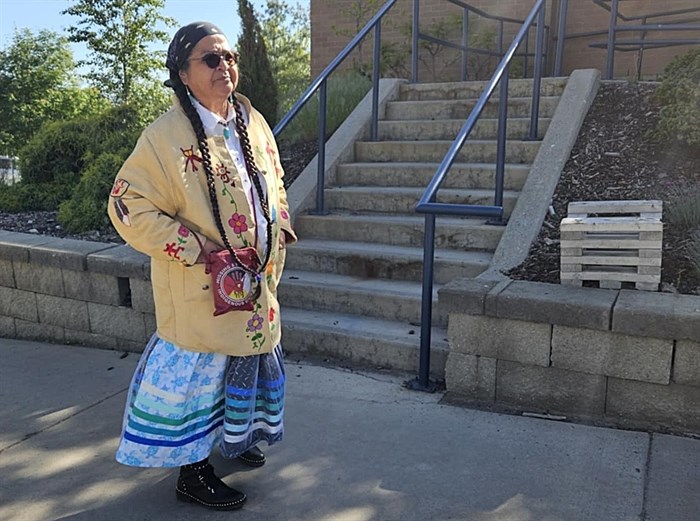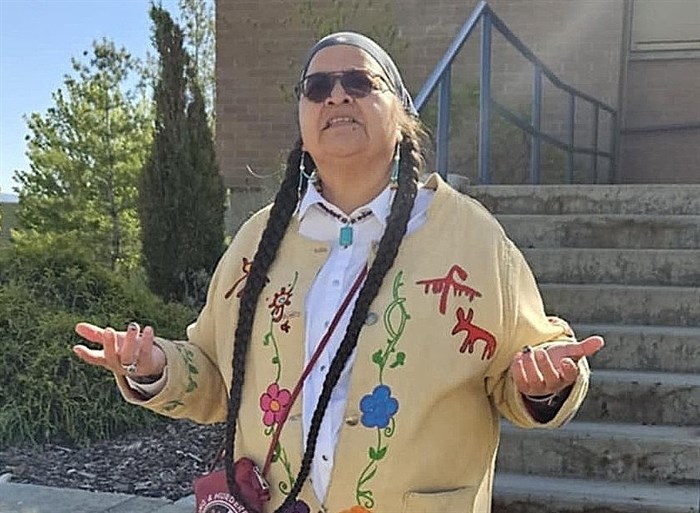
Kamloops resident Meste'si Llucmetkwe Colleen Seymour is pictured on the Thompson River University campus in her treasured buckskin coat and a skirt given to her by a two spirit brother.
(SHANNON AINSLIE / iNFOnews.ca)
May 20, 2025 - 6:00 AM
Colleen Seymour is a respected and influential elder in her Tk’emlúps te Secwépemc community in Kamloops who has dedicated her life to uplifting Indigenous education, health and reconciliation.
iNFOnews.ca met her at Thompson Rivers University on May 15 just before she opened for a conference on equity, diversity, inclusion and anti-racism.
Dressed in a buckskin coat embroidered with flowers and pictures that each tell a story, and a flowing skirt made by a two-spirit brother, Seymour has an ambiance of calm and joy.
She is a spiritual helper and knowledge keeper who guides healing ceremonies, land-based wellness initiatives, and Indigenous cultural teachings across the generations.
"I grew up on the land in Kamloops, my dad and mom grew up on the land," she said. "We'd often sit around a table where they passed down their teachings."
Seymour expresses herself and shares knowledge through recounting memories and telling stories. Her culture isn't just a way of life, it's who she is, something she thanks her parents for.
“My dad would say ‘don’t look, but observe,’” she said. “He was taught by a man that took him up the mountain and told him what medicinal plants he needed to find. And my dad being a young man, went out and was doing his work and all of a sudden, it’s wintertime. The teacher comes up and says there is a man who is very sick, did you get that medicine I asked you to get?”
Seymour said her dad had not got the medicine and had to build a fire to thaw the ground to get it.
“He got back to the teacher with the medicine but by then the sick man passed,” she said. “So that window, when somebody gives it to you, you have a choice, you make it now or you don’t.”

Kamloops resident Meste'si Llucmetkwe Colleen Seymour is pictured on the Thompson River University campus.
(SHANNON AINSLIE / iNFOnews.ca)
Seymour wears a bandana on her head atop two long, glossy braids in memory of her grandmother who used to put hankies on her head, and she carries little stones and pieces of fabric that each have a meaningful story or memory attached.
She points to a rose-coloured purse hanging from her shoulder. It was given to her by a man she gives balsamroot to.
“It’s (balsamroot) so hard to dig it up, and it’s about the effort that goes into it, you appreciate it, you have that intention you’re going to be able to get it and give it,” she said.
“He ends up using it and makes a cough syrup with it, he uses the leaf for a tea,” she said. “People come to him to get medicines. It’s these teachings I try to keep alive.”
READ MORE: iN NUMBERS: Building permit values plummet in Kamloops, steady in Okanagan
Seymour regularly prays for sick community members and asks the ancestors to be with them, and she tells stories of receiving healing and life lessons from others.
She passes along teachings to babies she gives first washes to, and to those who are dying.
“At the end of someone’s life, I get to make the medicine and I get to bathe them,” she said. “I want them to know we enjoyed life together, even if we just have that moment together, isn’t that powerful? Even when my mom was dying, I told her it’s a rebirth and she is going on to another time.
“Mom just wanted to be washed with two cups of water, she just wanted to smell the medicine. The care workers asked if we wanted them to keep the water to put back onto the land. That’s what I want from all healthcare workers.”
READ MORE: 'Cruel and ageist': The harsh reality of seniors living in crisis in Kamloops, Okanagan
Seymour said Indigenous people have been put down and kept down by government laws, which keeps her motivated to push for reconciliation.
“Back in the day, we were jailed and fined for doing things we do, like having a sweat lodge or potlatch ceremony,” she said. “If two or more gathered together they could all be jailed and fined."
She is familiar with the systemic racism and stigma that comes with being Indigenous.
“Growing up I was in an alleyway downtown with my brothers and cousins, and an RCMP officer comes by and he’s just looking at me like ‘what are you doing with all these men,’" she said. “There was this dirty image of me because they were boys.
“I want to change this kind of stigma. No more racism in the healthcare or education systems, or any system.”
READ MORE: Second First Nation files dispute over Highland Valley mine expansion
In the past, Seymour sat on panels to protest mining operations.
“My granny’s medicine was water, people would come by for it and she’d fill cups with water and help them,” she said. “She’d pull out medicine and wash people to cleanse them and take the used water back to return to the lake it came from.
“The water recycles itself, we know that, it’s natural, but as humans, we destroy it and make tailings ponds.”
When it comes to reconciliation, Seymour is motivated to keep pushing for change.
“There are things I want to change even in this university, let us help develop curriculum, call us to the table, that’s where changes are going to happen,” she said. “Let us sit at the table with you, that’s reconciliation.”
READ MORE: Cutting edge sustainable aviation fuel facility planned for Kamloops
When asked why she is so passionate about the work she does in her community, she referenced the medicinal plants she shows others how to forage.
“Right here at this moment, this is our moment,” she said. “Just like the medicinal plants that only grow at certain times of the year, we get to thrive and be the best person we can be right now.”
Seymour's Indigenous name is Meste'si Llucmetkwe, meaning "dips in water."
READ MORE: Kamloops artist sharing 'cultural significant' tales as Vancouver library's Indigenous storyteller
Seymour was recently honoured with a BC Achievement Foundation Award for her dedication to the reclamation of traditional knowledge, her leadership and love for the people, the land and Secwepemctsi´n, the language she is reclaiming through the First Peoples’ Cultural Council’s Language Revitalization program.
She is a founding member of the BC-Indigenous Health Nursing Chair Program and the Rainbow Healing Society, and sits on advisory bodies including the Sewépemc Child and Family Services Agency and the Grandmothers’ Council for the BC Indigenous Health Nursing Research Chair.
To contact a reporter for this story, email Shannon Ainslie or call 250-819-6089 or email the editor. You can also submit photos, videos or news tips to the newsroom and be entered to win a monthly prize draw.
We welcome your comments and opinions on our stories but play nice. We won't censor or delete comments unless they contain off-topic statements or links, unnecessary vulgarity, false facts, spam or obviously fake profiles. If you have any concerns about what you see in comments, email the editor in the link above. SUBSCRIBE to our awesome newsletter here.
News from © iNFOnews, 2025